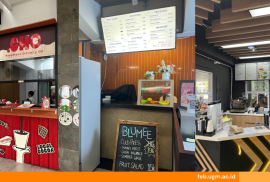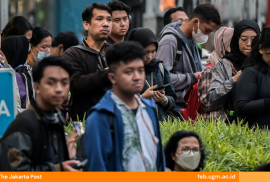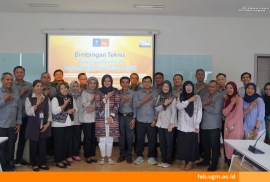Faculty of Economics and Business Universitas Gadjah Mada (FEB UGM) held the event Research Dissemination Day (RDD) on Saturday (15/12) in the 8th floor Auditorium of Learning Center Building FEB. With the theme of “Exploring Opportunities Amidst Global Challenges and Uncertainty”, the event discussed RDD strategies and steps for encountering global uncertainty through the dissemination of research that has been done by the lecturer and researcher from Department of Economics, FEB UGM. Those who joined the research dissemination including Muhammad Edhie Purnawan, Rimawan Pradiptyo, Hengki Purwoto Akbar Ahmad, Susamto, Sahadewo, Sekar Aryo Gumilang Utami Setiastuti, Amri Anjas Asmara, and Traheka Erdyas Bimanatya.
The event opened with a welcome speech by the Vice Dean for Research, Community Service, Cooperation, and Alumni FEB UGM, Amirullah Setya Hardi. In his speech, Amirullah conveyed that dissemination is the obligation of the researcher who already done in carrying out his research. In addition, he also added that this event is for FEB UGM in maintaining the value of quality research and teaching. Amirullah hopes in the following year lecturers and researchers from the Department of Accounting and Business Management can participate in conducting dissemination of research.
The event was divided into two sessions. Attended as moderator for the first session, the Secretary of Department of Economics FEB UGM Eny Sulistyaningrum. The first session topic was more focused on the banking and finance sectors both in the conventional and syariah. Edhie Purnawan said that the rapid technological development led to a shift in the use of money from the conventional money into digital money. He added that the International Monetary Fund (IMF) predicts the next 10-20 years people are already using digital money for the transaction and no longer using conventional money transaction. In addition, students of FEB UGM also need to learn more about technology in order to able to compete in the labour market. “Start to learn coding, dong! Start learning technology so you will not lose to foreign labour,” said Edhie.
Still on the same session, Gumilang — in the study of joint experiments with Bernardinus Maria Anthony and Rimawan Pradiptyo — revealed that the magnitude of the guarantee does not affect small banks in taking a risky project because small banks already have a tendency of taking risky projects. “The moral hazard occurs at small banks caused by high credit interest rates when the quantity guarantees high,” says Gumilang. Gumilang also added the abolition of the warranty and the determination of the differential premiums are pushing banks to offer interest on top of interest threshold and also encourage large banks to increase the tendency of bank take a risky project.
From the side of Sharia, Akbar conveys his research concerning the Credit Risk in Islamic and Conventional Banking: More Evidence from a Bank-Level Panel Data Analysis. Still, on the first session, Rimawan presents results of research — research conducted jointly with Putu Sanjiwacika Wibisana and Putu Arya Wigita — about unregulated corruption. Rimawan said that the largest corruption is not coming from the public sector — though that is regulated in the regulation of corruption that 90 percent of the public sector — but it is from the private sector. “Corruption in the private sector reached 119.7 trillion from the year 2001-2015, was about 60 percent of the value that is corrupted,” added Rimawan. Based on the results of experimental research, Rimawan confirmed that the personal stress and the behavior that do not want to contribute when it found out that its corruption is arranged and announced to the public that there are people who take the money. In addition, if the punishment to a suspect corruption case is severe, it will cause increased welfare efficiency, but there will be a revelation aversion if it has happened.
On the 2nd session which was moderated by Amirullah, lecturers and young researchers Department of Economics FEB UGM showed their work. Hengki explained his work on “Testing for Political Budget Cycles: Evidence from Indonesia Municipalities”. Traheka discussed how world oil prices have an impact on stock prices in Indonesia through the VECM approach (Vector Error Correction Model). Still, about world oil prices, Sekar revealed her latest work on “Time-varying pass-through of World Oil Prices Inflation to CPI Inflation in Indonesia”. On the other hand, Amri explained there is a technological gap between developing countries with developed countries. In his research, Amri modelled determinants factor that influences technological catch-up.
Source: Try Luthfi




